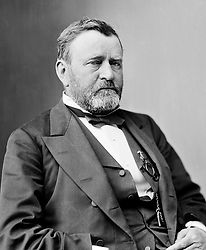The Battle of Vicksburg was faught in Vicksburg, Mississippi starting in May 18, 1863 and ending July 4, 1863 (Alan Brinkley. The Unfinished Nation. 6th edition. 2010). This long and bloody campaign for the port city of Vicksburg was lead by the Union General, Ulysses S. Grant. Grant wanted to take this city because it was an essential port to the Mississippi River and it would increase the speed of the Union advance. Lincoln once said of Grant after the battle of Shiloh that Grant was a great architect in the Union victories in the Civil War ("Ulysses Simpson Grant." Historic World Leaders. Gale, 1994.).
Grant battled with the confederate army and their commander General John C. Pemberton and drove the Confederates back into the fortified city. Pemberton knew that if the Confederates were going to have a hope of winning the war, they needed to hold the city and furthermore the Mississippi. Out numbered and low on supplies Pemberton defended and hoped for reinforcements. After a forty day siege of relentless cannon fire Pemberton had no choice but to surrender to Grant on July 4, 1863 or die of starvation and of cannon fire behind the barracade.
The signicance of this battle was that the Union Army now had control over the Mississippi River in conjuction with of a similar Union victory at Port Hudson at the hands of Major General Nathaniel Banks. The Union would control the Mississippi for the rest of the war.

Ulysses S. Grant

John C. Pemberton

This was considered a major turing point in the war for the Union, especially having defeated General Lee at Gettysburg the previous day. It devestated the Confederate's already slow supply line and hurt the southern war effort considerably. It also isolated the confederate states west of the Mississippi such as Texas., Louisiana, and Arkansas. This also allowed for the Union to more quickly get troops and supplies into the south via the Mississippi River furthering the Anaconda Plan. This started a rapid decline in what the Confederates could do against the rapid Union advance and ended in the loss of the war for the Confederates.